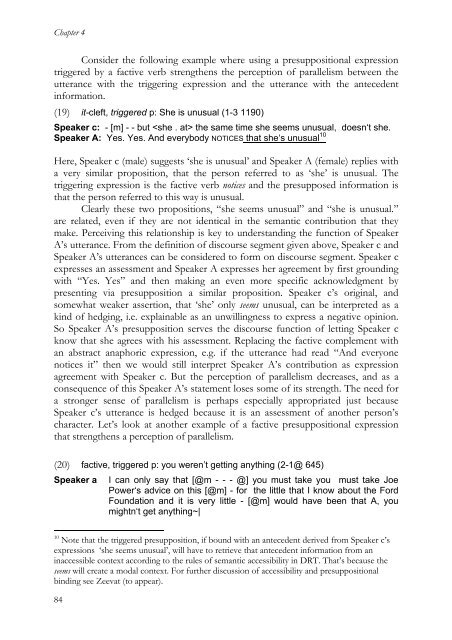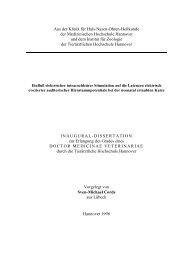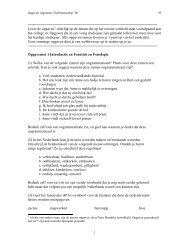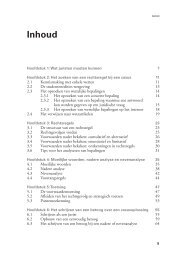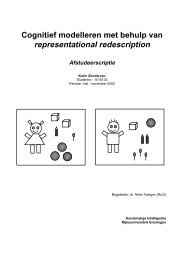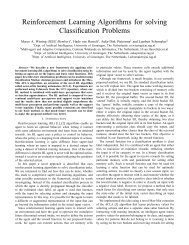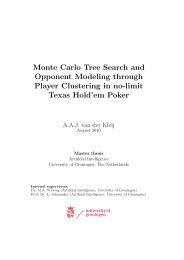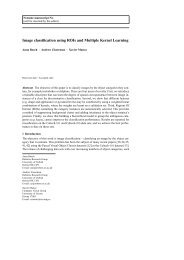Presuppositions in Spoken Discourse
Presuppositions in Spoken Discourse
Presuppositions in Spoken Discourse
Create successful ePaper yourself
Turn your PDF publications into a flip-book with our unique Google optimized e-Paper software.
Chapter 4<br />
Consider the follow<strong>in</strong>g example where us<strong>in</strong>g a presuppositional expression<br />
triggered by a factive verb strengthens the perception of parallelism between the<br />
utterance with the trigger<strong>in</strong>g expression and the utterance with the antecedent<br />
<strong>in</strong>formation.<br />
(19) it-cleft, triggered p: She is unusual (1-3 1190)<br />
Speaker c: - [m] - - but the same time she seems unusual, doesn‘t she.<br />
Speaker A: Yes. Yes. And everybody NOTICES that she‘s unusual 10<br />
Here, Speaker c (male) suggests ‘she is unusual’ and Speaker A (female) replies with<br />
a very similar proposition, that the person referred to as ‘she’ is unusual. The<br />
trigger<strong>in</strong>g expression is the factive verb notices and the presupposed <strong>in</strong>formation is<br />
that the person referred to this way is unusual.<br />
Clearly these two propositions, “she seems unusual” and “she is unusual.”<br />
are related, even if they are not identical <strong>in</strong> the semantic contribution that they<br />
make. Perceiv<strong>in</strong>g this relationship is key to understand<strong>in</strong>g the function of Speaker<br />
A’s utterance. From the def<strong>in</strong>ition of discourse segment given above, Speaker c and<br />
Speaker A’s utterances can be considered to form on discourse segment. Speaker c<br />
expresses an assessment and Speaker A expresses her agreement by first ground<strong>in</strong>g<br />
with “Yes. Yes” and then mak<strong>in</strong>g an even more specific acknowledgment by<br />
present<strong>in</strong>g via presupposition a similar proposition. Speaker c’s orig<strong>in</strong>al, and<br />
somewhat weaker assertion, that ‘she’ only seems unusual, can be <strong>in</strong>terpreted as a<br />
k<strong>in</strong>d of hedg<strong>in</strong>g, i.e. expla<strong>in</strong>able as an unwill<strong>in</strong>gness to express a negative op<strong>in</strong>ion.<br />
So Speaker A’s presupposition serves the discourse function of lett<strong>in</strong>g Speaker c<br />
know that she agrees with his assessment. Replac<strong>in</strong>g the factive complement with<br />
an abstract anaphoric expression, e.g. if the utterance had read “And everyone<br />
notices it” then we would still <strong>in</strong>terpret Speaker A’s contribution as expression<br />
agreement with Speaker c. But the perception of parallelism decreases, and as a<br />
consequence of this Speaker A’s statement loses some of its strength. The need for<br />
a stronger sense of parallelism is perhaps especially appropriated just because<br />
Speaker c’s utterance is hedged because it is an assessment of another person’s<br />
character. Let’s look at another example of a factive presuppositional expression<br />
that strengthens a perception of parallelism.<br />
(20) factive, triggered p: you weren’t gett<strong>in</strong>g anyth<strong>in</strong>g (2-1@ 645)<br />
Speaker a I can only say that [@m - - - @] you must take you must take Joe<br />
Power‘s advice on this [@m] - for the little that I know about the Ford<br />
Foundation and it is very little - [@m] would have been that A, you<br />
mightn‘t get anyth<strong>in</strong>g~|<br />
10 Note that the triggered presupposition, if bound with an antecedent derived from Speaker c’s<br />
expressions ‘she seems unusual’, will have to retrieve that antecedent <strong>in</strong>formation from an<br />
<strong>in</strong>accessible context accord<strong>in</strong>g to the rules of semantic accessibility <strong>in</strong> DRT. That’s because the<br />
seems will create a modal context. For further discussion of accessibility and presuppositional<br />
b<strong>in</strong>d<strong>in</strong>g see Zeevat (to appear).<br />
84


